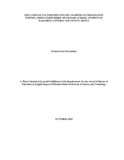EDUCATIONAL FACTORS INFLUENCING LEARNING OF IMAGINATIVE WRITING AMONG FORM THREE SECONDARY SCHOOL STUDENTS IN KAKAMEGA CENTRAL SUB COUNTY, KENYA
Abstract
Secondary school students in Kenya learn imaginative writing through English, a
second language performed dismally making educators and the general Kenyan
public worried. This study established educational factors influencing learning of
imaginative writing in secondary schools in Kakamega Central Sub County, Kenya. It
investigated the strategies secondary school teachers of English use in the teaching of
imaginative writing, Form Three students’ practices used to learning of imaginative
writing, challenges faced during imaginative writing and challenges faced in teaching
imaginative writing. Guided by The Input Hypothesis of Krashen’s Monitor Theory
of Second Language Acquisition (SLA), the study used a descriptive survey design
and sampled 7 out of 23 public secondary schools in Kakamega Central Sub County
through stratified, purposive and simple random sampling. 271 Form Three secondary
school students and 7 secondary school teachers of English participated in the study.
Questionnaires, interview schedules, participant lesson observation schedule and
document analysis schedule were used to collect data on teaching strategies, practices
students used, challenges students faced and challenges teachers faced respectively in
the learning of imaginative writing. Piloting determined validity and reliability of the
research tools. Permission was sought from relevant authorities before conducting
research. Quantitative data was analyzed using the Statistical Package for Social
Sciences (SPSS) and presented in frequency tables and percentages, bar graphs and
pie charts. Qualitative data in turn was analyzed based on themes and content, and
presented descriptively in words. Findings indicate that question and answer teaching
approach was commonly used, insufficient instructional materials and lack of
computer competence negatively affected 86 percent of teachers of imaginative
writing. Students had challenges with using correct spellings, appropriate use of
tenses and good use of punctuation marks. Further, most of the students lacked selfmanagement
skills in imaginative writing and teachers taught large classrooms with
insufficient instructional materials for imaginative writing. The study recommends
workshops for teachers on imaginative writing, appropriate teaching approaches and
integration of technology into the imaginative writing lessons. Further, learners would
be encouraged to take some time to plan, write and edit their imaginative writing
exercises to minimize spelling errors and wrong punctuation during imaginative
writing. The study suggests that, among other areas, studies be carried out on the role
of information technology, gender and first language in influencing learning of
imaginative writing in schools.
Collections
- School of Education [71]

